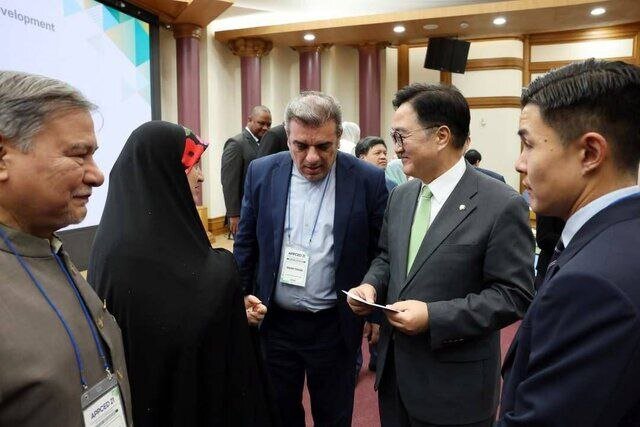Iran attends 21st APPCED on ‘climate resilience’

TEHRAN – An Iranian delegation led by Somayyeh Rafiei, MP and the vice president of the Asia-Pacific Parliamentarians Conference on Environment and Development (APPCED) executive committee, participated in the 21st APPCED, held in South Korea on September 23.
Hosted by the National Assembly of the Republic of Korea, the main theme of the conference was ‘Together, for Climate Resilience’.
The event served as a platform for parliamentarians from the Asia-Pacific region to exchange ideas and best practices, as well as promote joint efforts on environmental issues. It also aimed to strengthen regional partnerships and parliamentary leadership to build a more resilient future.
Discussing the urgency of climate change and its impacts, particularly on vulnerable nations, highlighting the need for increased international support, through accessible climate finance mechanisms, were among other discussed issues.
On the sidelines of the conference, Rafiei and Woo Won-shik, the Speaker of the National Assembly of South Korea, held a meeting. The two sides underlined the importance of boosting collaborations and sharing expertise in different fields, such as the environment.
APPCED was founded in June 1993 by the Korean Parliamentary League on Children, Population, and Environment (CEP) following the Rio Earth Summit in 1992.
It aimed to organize meetings among member states to address sustainable development issues and seek joint measures against environmental concerns.
Iran played host to the 17th and 19th General Assembly of APPCED in 2014 and 2018.
The 20th Executive Committee Meeting of APPCED was held on June 14-15 in Seoul, South Korea, in 2023.
Environmental diplomacy
Being transboundary, many complicated environmental challenges can be addressed through environmental diplomacy, which means negotiations among two or more countries.
Environmental diplomacy is used globally to settle problems such as conflicts over sources of energy, water, and climate change, IRNA reported.
The fact that all the countries share the same environment necessitates fostering environmental diplomacy to settle disputes over water resources, environmental pollution, and climate change impacts.
Environmental diplomacy is an effective and required tool to mitigate and eliminate the severe consequences by fair distribution of responsibilities among involved countries as they present their national interests and solutions.
Sand and dust storms (DSDs) are a typical example of meteorological hazards in West Asia, where many countries are involved, as some generate them and some others are affected by them.
SDSs hit countries such as Saudi Arabia, Iraq, Syria, Turkey, Iran, and sometimes parts of Azerbaijan, Turkmenistan, and even Afghanistan and Pakistan.
Removing pollution from the Aras River and securing the Hirmand River water rights, as well as some wetlands, are other examples where environmental policies have been used to resolve the conflicts.
Therefore, to mitigate climate change impacts and achieve sustainable development goals, environmental policy is required to be strengthened to help Iran, as well as its neighboring countries, benefit from available resources and secure our rights at the international level.
These dust particles have devastating impacts on respiratory health and ecosystems; they result in the closure of airports, schools, and offices, affect electricity transmission infrastructures, and bring about economic losses.
MT/MG
